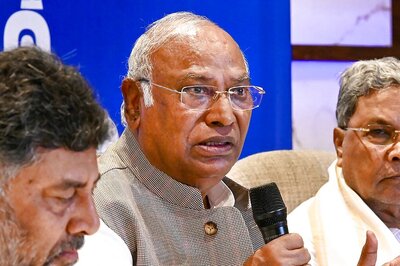
views
The Reserve Bank of India (RBI) is not currently looking at allowing non-banking financial companies (NBFCs) to issue credit cards, a CNBC TV-18 report said. It added that the “issue of allowing NBFCs to issue credit cards is not on the table right now”.
This comes amid reports that the RBI may allow strong non-banking financial companies to issue credit cards. In a notification in July 2004, the RBI said, “NBFCs are not allowed to undertake credit card business without prior approval of Reserve Bank of India. However, we have been receiving requests from NBFCs for permission to issue debit cards, stored value cards, smart cards, value added cards, etc.”
Currently, NBFCs distribute credit cards of banks with whom they have tie-ups.
According to an April 21 regulation from the RBI, “Without RBI nod, NBFCs shall not issue debit, credit cards etc.” This fanned hopes that the central bank may end up entertaining requests from NBFCs to issue their own credit cards.
In a note on Monday, Brokerage firm Jefferies highlighted that an in-house credit card program can help Bajaj Finance expand into deeper markets. India’s largest non-bank lender by market capitalization has a network of 3,500 branches, relationships with over 1,40,000 merchants and a customer base of nearly 60 million.
Jefferies also highlighted that if Bajaj Finance manages to achieve even 20-40 percent cross-sell to its client base, it can make a profit of anywhere between Rs 900 crore and Rs 1,700 crore within three years. The profit figure is 5-10 percent of the company’s projected profit for FY25.
In June, the Reserve Bank of India also allowed credit cards to be linked with the unified payments interface (UPI), which will enable more people to make payments using the popular platform. Till now, only debit cards connected to savings bank accounts and current accounts were allowed to link up to the UPI platform.
Currently, making UPI payments is free, while credit card companies usually depend on the merchant discount rate (MDR), which is charged on every usage for making merchant payments as a revenue stream.
The central bank is also changing credit card rules from October 1. According to the RBI website, “Tokenisation refers to replacement of actual card details with an alternate code called the “token”, which shall be unique for a combination of card, token requestor (i.e. the entity which accepts request from the customer for tokenisation of a card and passes it on to the card network to issue a corresponding token) and device (referred hereafter as “identified device”).” Customers who do transactions online have already been receiving notifications to save or tokenise their card before October 1, meaning the deadline is on September 30.
Read all the Latest Business News and Breaking News here

















Comments
0 comment